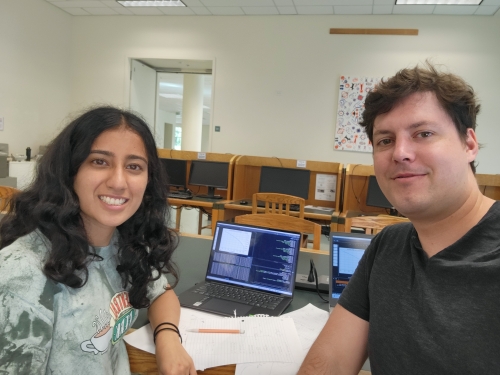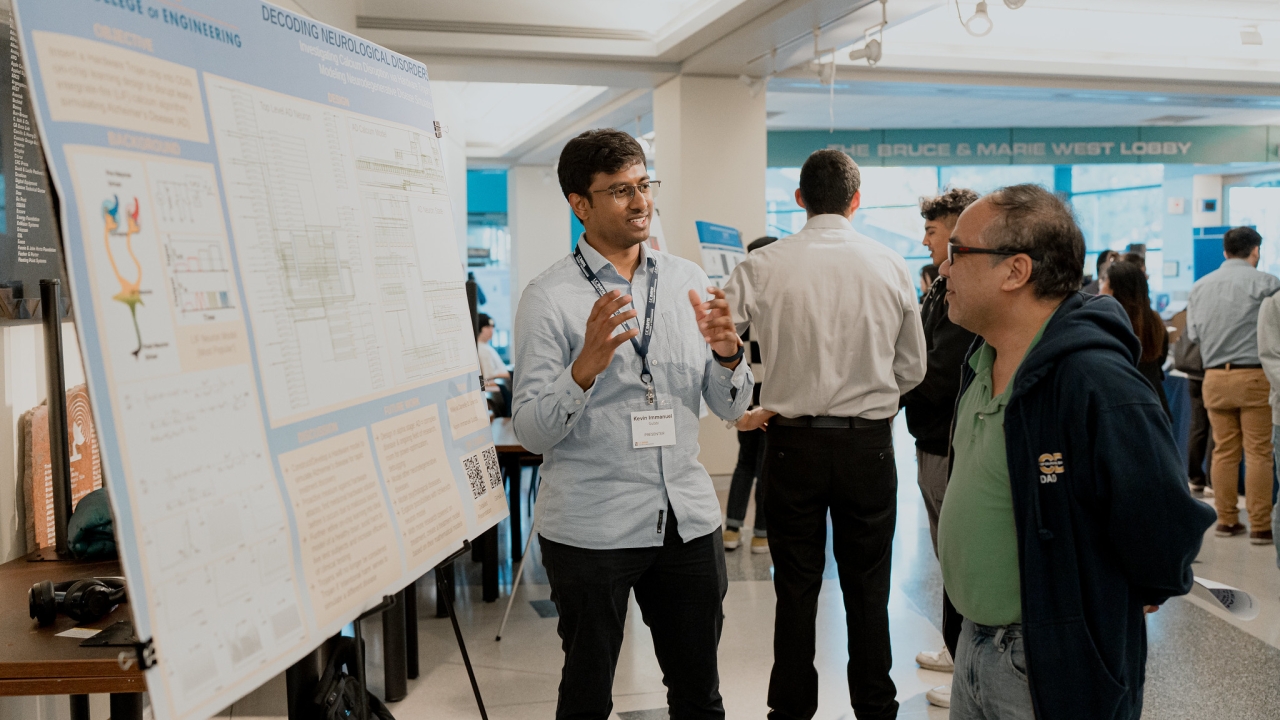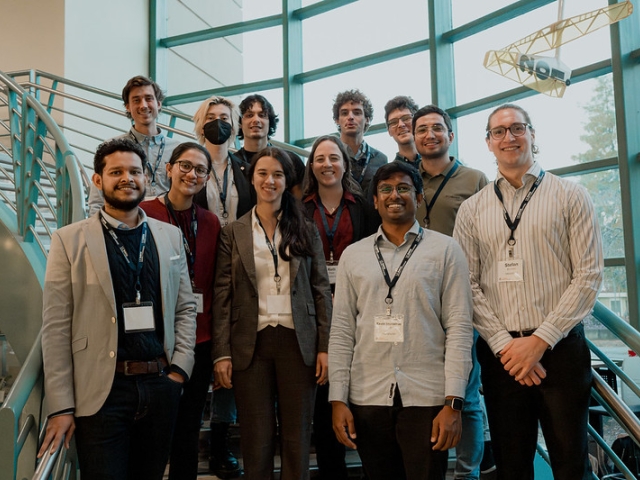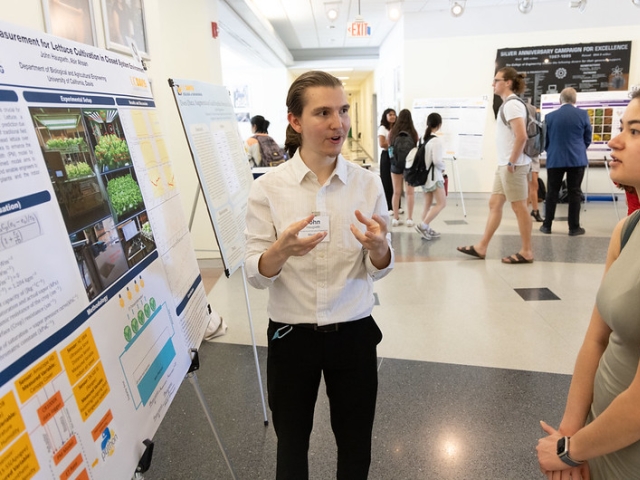
Partnering in Research and Mentoring

Research and mentoring are critical aspects of a student’s experience.
The UC Davis College of Engineering is pleased to support E-SEARCH, a program launched in 2023 for undergraduates who are considering graduate study or careers in engineering research by linking them with engineering graduate students who are conducting research projects. The program aims to broaden participation in engineering advanced study, introduce students to new career paths, demonstrate the real-world impacts and applications of engineering research, and provide graduate students with teaching and mentoring opportunities.
This cohort-based program invites current students to participate in program activities for one quarter. Participants will engage in program elements including research experience, mentoring from current graduate students, and support for preparing application materials for graduate study.
View our poster presented at the 2023 Scholarship of Teaching & Learning Conference to learn more about what we are learning from participants! (Credit: Mandeep Singh Basson, Ph.D. and former Mentor)

E-SEARCH Opens Doors to Higher Education
The new research-focused mentorship program unlocks the potential to pursue academic careers in engineering for undergraduates
Read Article

Mentors (Doctoral Students)
Current UC Davis doctoral students enrolled in the College of Engineering are eligible to apply to be a Mentor. Mentors will meet regularly with their mentee to discuss shared interests and goals. The mentoring pair will also identify a short-term research experience that can be completed by the end of the quarter. Additional mentoring activities include:
- Face-to-face check-in with mentees on a regular basis
- Introducing mentees to how academic research is conducted
- Share experiences to illustrate their own journey to graduate school
In order to best match mentors with mentees, applicants for Mentors will be asked to share general information on their research efforts, faculty advisors, previous mentoring experience, and motivation.
Applications for the Winter/Spring 2026 cohort are open!

Mentees (Undergraduates)
Engineering undergraduates who are in good academic standing and have a 2.500 or better GPA are eligible for participation. Working with a mentor, mentees will gain insights into graduate study in engineering, develop hands on research skills, and build valuable professional connections that can support their academic and career goals.. The mentoring pair will also identify a short-term research experience that can be completed by the end of the quarter. Additional mentoring activities include:
- Regular meetings, in person, with your mentor
- Hands-on research experience
- Guidance on applying for graduate study
Factors such as shared interests with a mentor will also be considered in the selection process. Space is limited.
Applications for the Winter/Spring 2026 cohort are open!
Project Archive
Each project was devised by a mentee and mentor pair. Future participants will have the opportunity to design their own projects through collaborative efforts.
- Spring/Summer 2025
- Team 001 | Dynamic Data Collection & Monitoring of High Vacuum Pressure Gauges
Camila Nino Francia, M.A. Mort
Team 002 | Deep Learning-Based Snow Monitoring in California Using Sentinel-2 Satellite Data for Management of Snowpack Resources
Vivian Sun, Mohammadreza Narimani
Team 003 | The Influence of Structural Variations on Simulated Inelastic Neutron Scattering Spectra
Cole David Brown, Toulik Maitra
Team 004 | Multi-Modal PDF Chunking and Retrieval for Microcontroller Documentation
Ziyi Chen, Asmita Asmita
Team 005 | Frictional separation of granular materials in opposing directions via horizontal vibrations
Teddy Liu, Shelly Zhang
Team 006 | Understanding selectivity of Indium catalyst for reactive capture of CO2 by experimental and computational methods
Jessica Ting, Jenna Ynzunza, Sebastian Espina
Team 007 | Tracking Soil Displacement in Centrifuge Experiments Using Computer Vision and Convolution Algorithms
Ricardo Gonzales, Maziar Mivehchi
Team 008 | Predicting the Performance of Biochar Based Cement Composites Using Machine Learning
Anna Pandey, Souvik Roy
Team 009 | End-to-end AI Agent for Conducting Research
Gerard Anderias, Akash Bonagiri
Team 010 | Quantifying the rate of biogenic manganese oxide dissolution in a microfluidic soil environment
Adrian Munoz, Eleanor Fadely
Team 011 | Temperature Dependence of Solvent Mixtures for Polymer Patterning
Suhani Babu, Joaquin Mogollon Santiana
Team 012 | CIP Implementation in Wineries to Reduce Water and Chemical Use
Jonah Katsumata, Brooke Fanale
Team 013 | Human-AI Idea Selection: System Comparison and Feature Engineering
Naomi Zhao, Meredith Young-Ng
Team 014 | Phonon Modes Projection on Electron Phonon Coupling of Organic Semiconductors
Luna Park, Ray Chiang
Team 015 | Physics-Based Modeling, Control, and Simulation of a Two-Link Robotic Arm
Scarlett Salisbury, Aatam Gajjar - Fall 2024
- Team 001 | Sacramento County Freight Network Vulnerability to Natural Hazards
Kristen Wojciechowski, Daniel Orlando Rivera Royero
Team 002 | Advanced Multimodal Cognitive Impairment Stage Classification for Alzheimer's Disease Using Cross-Modal Vision Transformers
Liza Tinku Jose, Aditya Krishnan
Team 003 | Smart Home Central Control for Price-Response and Capacity Management
Shriya Sawant, Afshan Qamar
Team 004 | Optimizing Downstream Processing: Ammonium Sulfate Precipitation in Plant-Based Protein Purification
Ashley Nicole Ou, Anindya Karmaker
Team 005 | Enhancing Orchard Management with Deep Learning: Tree Segmentation Using Geospatial SAM2 Model and NAIP Aerial Imagery
Sarbani Kumar, Mohammadreza Narimani
Team 006 | The Nat Signal
Natalie Kuang, Hari Venugopalan
Team 007 | Computer Vision Recognition for Bouldering Assistance
Jonathan Wang, Sophie Quynn
Team 008 | Understanding a critical zika virus-host protein interaction through molecular simulations
Jeremy Yang, Vardhan Peddamallu
Team 009 | Framework to quantify greenhouse gas emissions (GHG) emissions from road network in the United States
Tian Doong, Iyanuoluwa Filani
Team 010 | Computational Model of Local Calcium Concentration on Stability of CaM/CaMKII Complex
Nithmi Jayasundara, Grace Jeng
Team 011 | Cotton Candy Conversion and Manufacturing: A Process Engineering and Economic Perspective
Hillary Vo, Aatam Gajjar
Team 012 | Investigating the Effects of Belt Grinding Parameters on Swarf Morphology for Additively Manufactured Cobalt Chromium
Dhruv Gullapalli, Felicia Fashanu
Team 013 | Real-Time Drowsiness Detection Using Machine Learning
Rithika Krishna Perugupalli, Momtanu Chakraborty
Team 014 | Neural Insights into the Correlation Between Music and Emotion: A Machine Learning Approach to Predicting Emotional Responses from Brainwaves
Sarayu Mummidi, Jayneel Vora
Team 015 | Seasonal CO2 Flux at Uvas Reservoir: Influence of Water Quality and Meteorology Parameters
Kinsey Kwan-Liu, Corrin Clemons - Summer 2024 Projects
- Read Project Abstracts Here
Team 001 | Organic Semiconductors: Can we quantify disorder using INS?
Rachel Long, Toulik Maitra
Team 002 | Automated Image Stitching for Stereomicroscopic Assessment of Inflammatory Bowel Tissue in Crohn's Disease Mouse Models
Chun-Ho Chen, Aditya Krishnan
Team 003 | Introducing Flow to Improve Patterning Resolution of Semiconducting-Polymers
Nix Gandham, Joaquin Mogollon Santiana
Team 004 | Influence of cortical neural cell-secreted soluble factors on glioma cell proliferation and morphological changes
Elias Guzman, Allison Pickle
Team 005 | Twice-Coverage Path Planning for Field Harrowing
Justine Ellery, Yuankai Zhu
Team 006 | Global Vegetation and Climate Insights Portal (GVCIP): A Google Earth Engine-Based Monitoring Tool
Nicholas Richmond, Mohammadreza Narimani
Team 007 | Predicting Leaf Nitrogen Content Using Spectral Reflectance: A Machine Learning Approach
Mandelina Chokry, Parastoo Farajpoor
Team 008 | Optimizing pH Conditions for BSA Adsorption onto a Cationic Ion Exchanger Using Bradford Assay
Issac Lara, Ece Goktayoglu
Team 009 | Development of an Image Analysis Protocol to Understand Thrombi Composition
Jadine Rodriguez, So Youn (Emily) Lee
Team 010 | Physics-Based Modeling of Lettuce Transpiration Rates in Greenhouse Environments
Neydi Palacios, Abir Ahsan
Team 011 | Equity Impacts of Sustainable Transport: Who is Affected and Where?
Edgar Cruz Mendoza , Weijing Wang
Team 012 | Low-Cost Automated Estimation of Almond Leaf Area Using Computer Vision and Artificial Intelligence Techniques
Rithika Krishna Perugupalli, Momtanu Chakraborty
Team 013 | Exploring the Temporal Variability of Diffusive Methane Flux Rates in Uvas Reservoir
Carly Wolf, Corrin Clemons
Team 014 | Dynamics of Coffee Roasting
Zaina Alnahlawi, Laudia Anokye-Bempah
Team 015 | Molecular Gymnastics: Exploring Ion-Induced Folding Variations in Alpha-Lactalbumin Using AI-Based Protein Modeling
Jennie Kim, Grace Jeng
Team 016 | Evaluating Denoising Diffusion Probabilistic Models: A Comparative Analysis of Generative Model Metrics
Kyle Luo, Jayneel Vora
Team 017 | Analyzing the Most Cost-Effective Materials for Storing Hydrogen
Jessica Dong, John Cadiz
Team 018 | Uncovering the Mechanisms of Delayed Graft Function (DGF) in Human Kidney Transplants Using Single-Cell Spatial Transcriptomics
Aashka Jhaveri, Yongheng Wang
Team 019 | Enhancing Coffee Research through Data-Driven Tools and Insights at Roastpic, Inc.
Andrew Chen, Alice Dien
- Spring 2024 Projects
Full project abstracts are available here
Team 001 | Hot Wheels Wind Tunnel
Ivan Leung, Daniel RiveraTeam 002 | Get Started with Python: Processing and Visualizing Census and Geospatial Data
Victoria Lam, Weijing WangTeam 003 | Enhancing Wildfire Monitoring through Remote Sensing with Sentinel-2 Satellite Imagery and Python Programming
Quynh Tran, Mohammadreza NarimaniTeam 004 | Vernacular materials for construction and building: an overview
Xiang Gu, Patrick CunninghamTeam 005 | Numerical Simulation of Passive Suspension Systems: Investigation of the Impact of Vehicle Type, Road Roughness, Dampers, and Springs
Anthony Castellanos, Maziar MivehchiTeam 006 | Nonlinear Effects of Gravity Loads on Irregular Frame Structures under Earthquakes and Wind
Betty Choy, Arka MaityTeam 007 | Dynamical Inference of Nonlinear Latent Structures in iEEG data during Decision Making
Angela Zhou, Logan PetersTeam 008 | Unsupervised Model for Depth Estimation
Doai Ngo, Katherine ChengTeam 009 | Evapotranspiration Rate Measurement for Lettuce Cultivation in Closed System Environment
John Haugseth, Abir AhsanTeam 010 | Does data augmentation teach deepfake detectors a clearer worldview?
Carly Wolf, Jayneel VoraTeam 011 | Side-Channel Analysis using STLINK V3PWR: Enhancing Hardware Security through Attack Simulation and Performance Monitoring
Donggeon Kim, Kevin Immanuel GubbiTeam 012 | An Exploration of Water Quality and Greenhouse Gas Dynamics in an Aerated versus a Non-Aerated Reservoir
Genevieve Imboden, Ruth ThirkillTeam 013 | Criteria to screen liquid organic hydrogen carriers (LOHCs) for coupling with direct isopropanol fuel cell (DIFC)
Shrishti Chezhian, Siddharth SontiTeam 014 | Autophagy Behavior in Neuronal Cells: Quantifying Morphological Cell Profiles
Elle Defensor, Neil Adia
This program is supported through the Next Level Education initiative.
